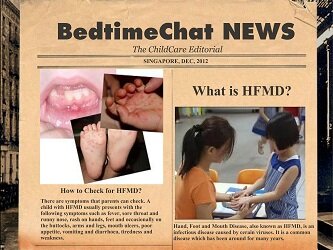What is Hand, Foot and Mouth Disease (HFMD)?
HFMD is an infectious disease caused by viruses that belong to the Enterovirus genus (group). It is a common disease which has been around for many years. This group of viruses includes polioviruses, coxsackieviruses, echoviruses, and enteroviruses.
- Coxsackievirus A16 is the most common cause of hand, foot, and mouth disease in the United States, but other coxsackieviruses have been associated with the illness.
- Enterovirus 71 has also been associated with hand, foot, and mouth disease and outbreaks of this disease.

Who does it affect?
It affects all age groups, but young children, under the age of 5 years, are more likely to be infected.
How does it spread?
HFMD is spread through direct contact with saliva, nasal discharge, faeces or the fluid from he blisters of an infected person. It can also be spread indirectly through articles contaminated by these secretions. Outbreaks can occur in childcare centres, kindergartens and schools. Some infected people may not have obvious symptoms or signs. They can also spread the virus.
How do you know if your child has HFMD?
A child with HFMD usually presents with the following symptoms:
- fever for 2 – 3 days
- sore throat and runny nose
- rash ( flat or raised red spots, some with blisters) on the hands (especially the palms), feet and occasionally on the buttocks, arms and legs.
- mouth ulcers
- poor appetite
- vomiting and diarrhoea
- tiredness and weakness
A child is infectious throughout the duration of the illness.
What should you do if your child has HFMD?
- Bring your child to your family doctor or nearest polyclinic.
- Encourage your child to drink plenty of fluids. You may need to give small amounts (e.g. 30ml) frequently (e.g. half hourly).
- Change to a soft diet such as mashed potatoes, porridge or pureed fruits.
- Give medications prescribed by the doctor, such as paracetamol syrups for fever and pain, and soothing gel for the mouth ulcers.
In most cases, your child’s immune system will overcome the infection in time and he will recover.
Is HFMD serious?
In most cases, HFMD is mild. However, a few children who are infected with the EV71 strain of the virus can become very ill, with signs and symptoms such as:
- disorientation, drowsiness and/or irritability
- fits
- severe headache, giddiness or neck stiffness
- breathlessness or turning blue
- dehydration – this can happen due to continuous vomiting, diarrhoea or poor fluid intake as a result of painful mouth ulcers. The child is very tired, has a dry tongue and may pass very little urine.
If you notice any of the above, bring your child to the Emergency Department of the nearest hospital immediately.
Speak Your Mind